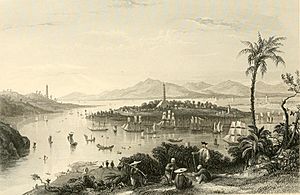Battle of Whampoa facts for kids
Quick facts for kids Battle of Whampoa |
|||||||
|---|---|---|---|---|---|---|---|
| Part of the First Opium War | |||||||
 View of Whampoa Island from Dane's Island |
|||||||
|
|||||||
| Belligerents | |||||||
| Commanders and leaders | |||||||
| James Bremer Edward Belcher |
Unknown | ||||||
| Strength | |||||||
| 1 ship of the line 2 corvettes 1 bomb ketch |
250 troops 25 guns |
||||||
| Casualties and losses | |||||||
| 1 killed | 15–20 killed | ||||||
The Battle of Whampoa was a fight between British and Chinese forces. It happened on March 2, 1841, near the city of Guangzhou (also called Canton) in China. This battle was part of a bigger conflict known as the First Opium War. The fighting took place on Whampoa Island, which is in the Pearl River.
The Battle of Whampoa
On March 2, 1841, a British leader named Commodore James Bremer sent Captain Edward Belcher on a mission. Captain Belcher was in charge of a ship called the Sulphur. His job was to explore a waterway called the Junk River.
Surprise Attack
The Sulphur was being pulled by three smaller boats from another ship, the Wellesley. As they got close to the northeast side of Whampoa Island, something unexpected happened. A Chinese artillery battery (a group of powerful guns) opened fire. These guns, about 25 of them, were hidden by thick tree branches.
Lieutenant Richard Symonds, who was leading the smaller boats, quickly cut the ropes. This let the boats move freely. The crews then landed on the shore.
Fighting on Land
The Chinese battery was defended by about 250 Manchu Tartar soldiers. These soldiers were part of the Chinese army. When the British landed, the Chinese soldiers ran into the nearby jungle to hide. However, the Sulphur used its own guns to fire into the jungle, forcing the soldiers out.
After the British took control of the forts where the guns were, they destroyed the Chinese guns. They also blew up the buildings and storage areas that held gunpowder and other supplies.
Results of the Battle
Commodore Bremer reported that about 15 to 20 Manchu Tartar soldiers were killed. On the British side, one sailor from the Wellesley died. He was hit in the lungs by grapeshot, which is a type of ammunition that scatters many small metal balls.
After this battle, Commodore Bremer handed over command of the land forces to Major General Hugh Gough. General Gough joined the British fleet on a ship called the Cruizer.
A Chinese official named Lin Zexu, who was involved in the Opium War, wrote in his diary on March 2: "I hear that the English rebel ships have already forced their way to the fort at Lieh-te." He then mentioned going to a meeting to discuss the situation.

